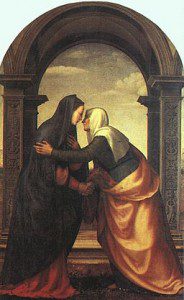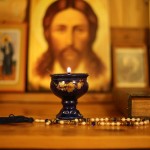
(Note: most Seven Joys devotions skip over the Visitation and count the Nativity of Christ as the second joy. The Franciscans, in their Franciscan Crown devotion, count the Visitation as the Second Joy and combine the Assumption and Crowning of Mary as one event for the seventh. The Visitation has always been one of my favorite Mysteries and I wouldn’t dare skip it over.)
The angel departed from Miriam, and she went in haste into the hill country, to visit Elizabeth.
How did she get there?
Women didn’t travel alone in those days. They didn’t just leave where they were and go where they liked. She must have had to get permission from someone. Maybe from her betrothed. Maybe that’s how she told Saint Joseph what had happened, and the angel came to him to confirm her account that same night.
I once saw a stained glass window depicting the Visitation, with Saint Joseph and his lily staff standing apart in the doorway. It makes perfect sense that he would have escorted her into the hill country. He was the new Aaron, the new guardian of the new Ark of the Covenant and the Presence she bore. I’ll bet he did take her to visit her cousin.
But this story isn’t about Saint Joseph. It’s about Miriam, her elderly cousin and the mysteries they carried: the prophet and the King.
I was taught growing up that Miriam went into the hill country to care for Elizabeth and serve her humbly as a live-in nurse until the baby came– a miserable task for the first trimester, but she did it out of humility. Years later, a wise Franciscan priest told me that she went to Elizabeth because she was afraid. She had been entrusted with this strange mystery, and she ran to talk to the older woman who knew all about it; to find someone who could understand, if anyone could. Those who raised her at the temple couldn’t comprehend it. Not even good Saint Joseph could. Only one person could. She went to find another woman who had become pregnant by a miracle.
There’s no reason these motives are in opposition to each other, of course. Miriam always did the Father’s will, and the Father wills that people help each other. In community, in real communities the way He intended from the beginning, people go to one another to help and be helped, to console and be consoled. There’s not a formal difference between the two. We pour ourselves out for one another and receive what is poured into us, neither counting the cost of our own gift nor spurning anyone else’s. We are one. This is one way in which we were created in the image of the Holy Trinity. So let’s say that Miriam was afraid and wanted comfort; let’s say that she intended to be a comforter, as well. And she didn’t see these as separate tasks, because she always did the Father’s will.
Miriam greeted Elizabeth. It is not written what she said. Perhaps she was formal, giving the customary polite address from a poor young virgin to the aged wife of a priest. Perhaps there were tears in her eyes and her voice, because she was afraid.
At the sound of her tearful and well-mannered greeting, the prophet leaped in Elizabeth’s womb.
Imagine a fetus at six months’ development, leaping. Not kicking or elbowing, leaping. Imagine how that would feel. We mothers can. Six months is beyond the age when they feel like little butterflies. At six months, if the baby leaps, your whole gut leaps with him. Your stomach lurches. You gasp because your diaphragm leaps as well. Elizabeth gasped with the prophet’s acrobatics in her womb, and then she too became a prophet. The Holy Ghost filled her. She knew exactly what she was seeing, and she prophesied.
Her prophecy is not the greeting of a respected older woman to an inferior. “Blessed are you among women, and blessed is the fruit of your womb! And why am I so honored, that the mother of my Lord should come to me? For as soon as the sound of your greeting reached my ears, the baby in my womb leaped for joy. Blessed is she who has believed that the Lord’s word to her will be fulfilled.”
Miriam rushes to the older woman’s arms. They embrace: John the Baptist, Greatest in the Kingdom, is brought into the Holy of Holies. His mother touches the Ark of the Covenant and lives.
Miriam’s fear is silent now, as the Joy of the Lord overtakes her. She sees as well. She sees that the Lord has arisen to scatter His enemies and overturn every earthly kingdom, through her. “My soul magnifies the Lord, and my spirit rejoices in my saving God. For He has looked with favor on the lowliness of His handmaid; from this day, all generations shall call me blessed. He that is mighty has done great things for me, and Holy is His name. He has mercy on those who fear Him in every generation. He has shown the strength of His arm; He has scattered the proud in the imagination of their hearts. He has cast down the mighty from their thrones, and has exalted the lowly. He has filled the hungry with good things, and the rich He has sent away empty. He has come to the help of His servant, Israel, for He has remembered His promise of mercy: the promise He made to our fathers, to Abraham and his children forever.”
The wife of the priest, the Prophet, the Ark and the Lord remained together in Elizabeth’s house for three months.
(image via Pixabay)













